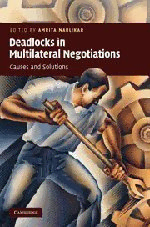Table Of ContentDeadlocks in Multilateral
Negotiations
Deadlocksareafeatureofeverydaylife,aswellashighpolitics.Thisvolume
focuses on the concept, causes and consequences of deadlocks in multi-
lateral settings, and analyses the types of strategies that could be used to
breakthem.Itcommenceswithadefinitionofdeadlock,hypothesisesabout
itsoccurrence,andproposessolutions.Eachchapterthenmakesanoriginal
contribution to the issue of deadlock – theoretical, methodological or
empirical – and further tests the original concepts and hypotheses, either
theoretically or through case-study analysis, developing or altering them
accordingly.Thisisauniquevolumewhichprovidesanin-depthexamina-
tion of the problem of deadlock and a more thorough understanding of
specific negotiation problems than has ever been done before. It will be
directlyrelevanttostudents,researchers,teachersandscholarsofnegotia-
tionandwillalsobeofinteresttopractitionersinvolvedinnegotiationand
diplomacy.
amrita narlikar is University Senior Lecturer in the Department of
Politics and International Studies at the University of Cambridge and a
Fellow of Darwin College. She is the author of International Trade and
Developing Countries: Bargaining Coalitions in the GATT and WTO
(2003), The World Trade Organization: A Very Short Introduction
(2005) and New Powers: How to become one and how to manage them
(2010).Sheisalsoco-editorofLeadershipandChangeintheMultilateral
TradingSystem(2009).
Deadlocks in Multilateral
Negotiations
Causes and Solutions
Edited by
amrita narlikar
cambridge university press
Cambridge,NewYork,Melbourne,Madrid,CapeTown,Singapore,
SãoPaulo,Delhi,Dubai,Tokyo
CambridgeUniversityPress
TheEdinburghBuilding,CambridgeCB28RU,UK
PublishedintheUnitedStatesofAmericabyCambridgeUniversityPress,NewYork
www.cambridge.org
Informationonthistitle:www.cambridge.org/9780521130677
©CambridgeUniversityPress2010
Thispublicationisincopyright.Subjecttostatutoryexception
andtotheprovisionsofrelevantcollectivelicensingagreements,
noreproductionofanypartmaytakeplacewithoutthewritten
permissionofCambridgeUniversityPress.
Firstpublished2010
PrintedintheUnitedKingdomattheUniversityPress,Cambridge
AcataloguerecordforthispublicationisavailablefromtheBritishLibrary
LibraryofCongressCataloguinginPublicationdata
Deadlocks in multilateral negotiations : causes and solutions /
edited by Amrita Narlikar.
p. cm.
ISBN978-0-521-11374-8(hardback)
1. Negotiation. 2. Conflictmanagement. I. Narlikar,Amrita. II. Title.
BF637.N4D43 2010
302.3–dc22
2010000322
ISBN978-0-521-11374-8Hardback
ISBN978-0-521-13067-7Paperback
CambridgeUniversityPresshasnoresponsibilityforthepersistenceor
accuracyofURLsforexternalorthird-partyInternetwebsitesreferredto
inthispublication,anddoesnotguaranteethatanycontentonsuchwebsitesis,
orwillremain,accurateorappropriate.
Contents
Listoffigures pagevii
Listoftables viii
Notesoncontributors ix
Acknowledgements xiii
Introduction
amrita narlikar 1
PartI Disciplinaryinsights 23
1 Thepoliticsofdeadlocks
andrew gamble 25
2 FromBrettonWoodstoHavana:multilateraldeadlocks
inhistoricalperspective
martin daunton 47
3 Talkingone’swayoutofstrikes
william brown 79
4 Litigatingthewayoutofdeadlock:theWTO,theEU
andtheUN
markus w. gehring 96
PartII Casestudies 121
5 TransatlanticintransigenceintheDohaRound:domestic
politicsandthedifficultyofcompromise
alasdair r. young 123
6 Knowtheenemy:uncertaintyanddeadlockintheWTO
amrita narlikar and pieter van houten 142
v
vi Contents
7 Enteringthezoneofagreement:theUnitedStatesinclimate
changenegotiations
sevasti-eleni vezirgiannidou 164
8 Theroleofinformalnegotiationprocessesinbreaking
deadlocks:theUNSecurityCouncil
jochen prantl 188
9 NegotiatinginternationalpoliciesonKosovo
pieter van houten 210
10 Beyondnegotiationdeadlocks:theimportanceofmediation
andleadershipchange
jacob bercovitch and carmela lutmar 232
Conclusion:casestudiesasevidence:lessonslearned
daniel druckman and amrita narlikar 254
Bibliography 280
Index 307
Figures
6.1 Thebasicsignallinggame page146
8.1 GrowthinUnitedNationsmembership,1945–2006 198
8.2 Formalmeetingsandinformalconsultationsofthe
SecurityCouncil,1972–82 201
8.3 Formalmeetingsandinformalconsultationsofthe
SecurityCouncil,1988–2007 202
vii
Tables
8.1 NumberofvetoescastintheUNSecurityCouncil,
1946–2008 page199
10.1 Descriptivestatistics 249
10.2 Deadlockinnegotiationandleadershipchange 251
10.3 Marginaleffects 251
11.1 Demonstrationsofhypotheses 258
11.2 Demonstrationsofsolutionsets 259
11.3 Typeofdeadlock 273
viii
Notes on contributors
Jacob Bercovitch is Professor of International Relations at the
University of Canterbury in Christchurch, New Zealand. He is a
Fellow of the Royal Society of New Zealand and former Vice
President of the International Studies Association. His research has
been concerned with how to achieve best practices in mediation.
He has written and edited thirteen books and authored more than
100scholarlypapersonvariousaspectsofinternationalconflictresolu-
tion and mediation. His most recent book is Handbook of Conflict
Resolution. He has held prestigious Fellowships from Harvard
University, the London School of Economics, Georgetown and the
HebrewUniversity.
William Brown is the Master of Darwin College and Professor of
Industrial Relations at Cambridge University. He was previously
Director of the ESRC’s Industrial Relations Research Unit at the
UniversityofWarwick.Hisresearchhasbeenconcernedwithcollective
bargaining,paydetermination,incomespolicy,paymentsystems,arbi-
tration,minimumwagesandtheimpactoflegislativechange.Hispub-
licationsincludePieceworkBargaining(1973),TheChangingContours
of British Industrial Relations (1981) and The Individualisation of
EmploymentContractsinBritain(1998).Hewasafoundationmember
oftheLowPayCommission,whichfixestheUK’sNationalMinimum
Wage. He is a member of the Advisory, Conciliation and Arbitration
Service(Acas)PanelofArbitrators,andwasanindependentmemberof
theAcasCouncil.In2002hewasawardedaCBEforservicestoemploy-
mentrelations.
MartinDauntonisProfessorofEconomicHistoryintheUniversityof
CambridgeandMasterofTrinityHall.Hispreviousworkincludestwo
volumes on the political economy of taxation in Britain since 1799,
which has led him into international transfers of ideas over taxation;
andtwovolumesontheeconomichistoryofBritainbetween1700and
ix
x Notesoncontributors
1951. His current writing and research covers the involvement of
Britainintheinternationaleconomysince1850whichformsthesubject
ofhisPresidentialaddressestotheRoyalHistoricalSociety,andabook
ontheeconomicgovernmentoftheworldsince1945.
Daniel Druckman is a professor in the Department of Public and
International Affairs at George Mason University. He has been the
Vernon M. and Minnie I. Lynch Professor of Conflict Resolution at
George Mason where he coordinated the doctoral programme at the
InstituteforConflictAnalysisandResolution.Heisalsoaprofessorat
the University of Queensland in Brisbane, Australia, a member of the
faculty at Sabanci University in Istanbul, and a visiting professor at
NationalYunlinUniversityofScienceandTechnologyinTaiwan,atthe
UniversityofMelbourne,andattheAustralianNationalUniversityin
Canberra.Hehaspublishedwidelyonsuchtopicsasnegotiatingbeha-
viour,nationalismandgroupidentity,humanperformance,peacekeep-
ing, political stability, non-verbal communication and research
methodology.Heisaboardmemberorassociateeditorofeightjournals
andco-editsanewbookseriesonInternationalNegotiation.Hereceived
the 1995 Otto Klineberg award for Intercultural and International
Relations from the Society for the Psychological Analysis of Social
Issues for his work on nationalism, a Teaching Excellence award in
1998 from George Mason, an award for the outstanding article pub-
lished in 2001 from the International Association for Conflict
Management (IACM), and the 2006 outstanding book award for
Doing Research: Methods of Inquiry for Conflict Analysis. He is the
recipientofthe2003LifetimeAchievementawardfromtheIACM.
AndrewGambleisProfessorofPoliticsattheUniversityofCambridge.
HeisaFellowoftheBritishAcademyandajointeditorofThePolitical
Quarterly and New Political Economy. His most recent book is
Between Europe and America: The Future of British Politics, which
wasawardedtheWJMMackenziePrize.In2005hereceivedtheIsaiah
BerlinPrizeforLifetimeContributiontoPoliticalStudies.
MarkusW.GehringisLecturerinInternationalandEuropeanLawat
theUniversityofCambridgeintheCentreofInternationalStudiesand
Fellow in Law at Robinson College. He holds an LL.M from Yale
and a Dr. jur. from Hamburg. He practiced European competition
andinternationaltradelawwithClearyGottliebintheirBrusselsoffice

